

Depression Part Two. I remember being endlessly entertained by the adventures of my toys.
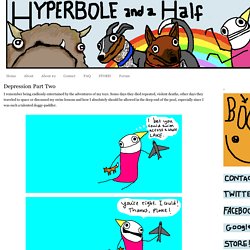
Some days they died repeated, violent deaths, other days they traveled to space or discussed my swim lessons and how I absolutely should be allowed in the deep end of the pool, especially since I was such a talented doggy-paddler. I didn't understand why it was fun for me, it just was. But as I grew older, it became harder and harder to access that expansive imaginary space that made my toys fun. I remember looking at them and feeling sort of frustrated and confused that things weren't the same. I played out all the same story lines that had been fun before, but the meaning had disappeared. Depression feels almost exactly like that, except about everything. At first, though, the invulnerability that accompanied the detachment was exhilarating. The beginning of my depression had been nothing but feelings, so the emotional deadening that followed was a welcome relief.
Which leads to horrible, soul-decaying boredom. Ontology. Meditation. Thich Nhat Hanh. Thích Nhất Hạnh (/ˈtɪk ˈnjʌt ˈhʌn/; Vietnamese: [tʰǐk ɲɜ̌t hɐ̂ʔɲ] ( ); born October 11, 1926) is a Vietnamese Zen Buddhist monk, teacher, author, poet and peace activist.

He lives in the Plum Village Monastery in the Dordogne region in the South of France,[1] travelling internationally to give retreats and talks. He coined the term Engaged Buddhism in his book Vietnam: Lotus in a Sea of Fire.[2] A long-term exile, he was given permission to make his first return trip to Vietnam in 2005.[3] Nhất Hạnh has published more than 100 books, including more than 40 in English. Lucid Dreaming. Lucid Dreaming. Lucid Dreaming/Induction Techniques. This page describes a number of lucid dream induction techniques.

It is recommended that you be able to recall at least one dream per night in order to maximize the effectiveness of these methods. Preliminary Knowledge[edit] Certain elements are common to many of the lucidity-inducing techniques discussed later in this chapter. To better understand these techniques, these common components will be discussed first. Sleep Interruption[edit] An element shared by many of the techniques is sleep interruption. Sleep interruption is a natural part of the MILD technique (described below) which trains you to arise immediately after your dreams end. Sleep Continuity[edit] If you have trouble initially falling asleep, avoid drinking water for about an hour before going to bed.
If you still have difficulty getting to sleep, try reading about lucid dreaming just before going to sleep. Lucid Dreaming/Using. Dream stabilization[edit] Once you are able to dream lucidly, you may find that it is difficult to stay in the dream; for example, you may wake instantly or the dream may start “fading” which is characterized by loss or degradation of any of the senses, especially vision.
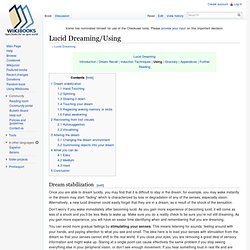
Alternatively, a new lucid dreamer could easily forget that they are in a dream, as a result of the shock of the sensation. Don't worry if you wake immediately after becoming lucid. As you gain more experience of becoming lucid, it will come as less of a shock and you’ll be less likely to wake up. Make sure you do a reality check to be sure you’re not still dreaming.
You can avoid more gradual fadings by stimulating your senses. Consciousness. Non-human Animal Consciousness. Qualia. In philosophy, qualia (/ˈkwɑːliə/ or /ˈkweɪliə/; singular form: quale) are what some consider to be individual instances of subjective, conscious experience.
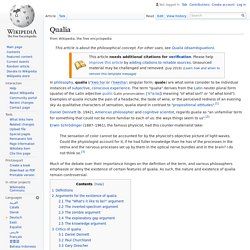
The term "qualia" derives from the Latin neuter plural form (qualia) of the Latin adjective quālis (Latin pronunciation: [ˈkʷaːlɪs]) meaning "of what sort" or "of what kind"). Examples of qualia include the pain of a headache, the taste of wine, or the perceived redness of an evening sky. As qualitative characters of sensation, qualia stand in contrast to "propositional attitudes".[1] Daniel Dennett (b. 1942), American philosopher and cognitive scientist, regards qualia as "an unfamiliar term for something that could not be more familiar to each of us: the ways things seem to us".[2] Erwin Schrödinger (1887–1961), the famous physicist, had this counter-materialist take: Philosophy of mind. A phrenological mapping[1] of the brain – phrenology was among the first attempts to correlate mental functions with specific parts of the brain Philosophy of mind is a branch of philosophy that studies the nature of the mind, mental events, mental functions, mental properties, consciousness, and their relationship to the physical body, particularly the brain.
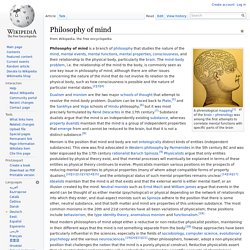
The mind–body problem, i.e. the relationship of the mind to the body, is commonly seen as one key issue in philosophy of mind, although there are other issues concerning the nature of the mind that do not involve its relation to the physical body, such as how consciousness is possible and the nature of particular mental states.[2][3][4] Mind–body problem[edit] Our perceptual experiences depend on stimuli that arrive at our various sensory organs from the external world, and these stimuli cause changes in our mental states, ultimately causing us to feel a sensation, which may be pleasant or unpleasant. Arguments for dualism[edit] Philosophy. Philosophy.
Questions no one knows the answers to. Philosophy Wiki. List of unsolved problems in philosophy. This is a list of some of the major unsolved problems in philosophy.
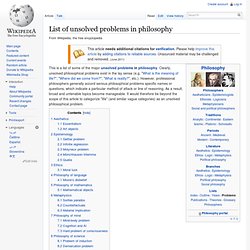
Clearly, unsolved philosophical problems exist in the lay sense (e.g. "What is the meaning of life? ", "Where did we come from? " Philosophers and Their Works. Twelve Virtues of Rationality. The first virtue is curiosity.
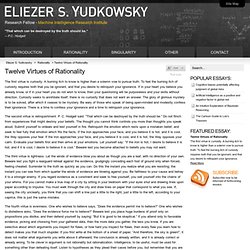
A burning itch to know is higher than a solemn vow to pursue truth. To feel the burning itch of curiosity requires both that you be ignorant, and that you desire to relinquish your ignorance. If in your heart you believe you already know, or if in your heart you do not wish to know, then your questioning will be purposeless and your skills without direction. Curiosity seeks to annihilate itself; there is no curiosity that does not want an answer. How to be Happy.